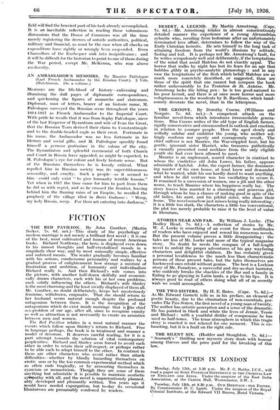FICTION
THE RED PAVILION. By John Gunther. (Martin Seeker. 7s. (Id. net.)—This study of the psychology of modern marriage is not merely a brilliant first novel : it is one of the best, most cultivated and human of recent American books. Richard Northway, the hero, is displayed even down to his inmost thoughts and half-crystallized moods in a singularly clear way, and by most unusually simple, effective and Unforced means. The reader gradually becomes familiar with his serious, cumbersome personality and realizes by a gradual process of enlightenment how strange a mixture of frustration and ambition, of humanity and individualism Richard really is. And -then Richard's wife comes into the picture, with another half-dozen skilfully and econmi- cally -drawn characters, each with his or her own problems, each subtly influencing the others. Richard's . wife Shirley is the most charming and the least vividly displayed of them all.. Mr. Gunther, no doubt deliberately, keeps her mysteriously feminine, withdrawn, enigmatic. That she should return to her husband seems natural enough despite the profound antagonism between them. It is the recognition of the antagonisms which do exist inside marriage that is lithe chief sex-problem of our age, after all, since to recognize enmity as well as attraction is not necessarily to create an armistice between men and women. •
The Red Pavilion relates in a most natural manner the events which follow upon Shirley's return to Richard. -Free in language perhaps, the book is in treatment and manner a model of decorum. It deserves careful reading, for it is a part attempt towards the solution of vital contemporary perplexities. Richard and Shirley seem forced to avoid each other in order to retain their self-respect, or perhaps rather • to be able each to adapt himself to the other.. In contrast to them are other characters who avoid rather than attack difficulties—whether by blindly hazarding themselves on erotic seas or by the too common experimental method which so often ends tragically, or by armouring themselves in cynicism or monasticism. -Thongh -they. are some of them anything but admirable it is p(ssible to maintain aesthetic sympathy with all, and the novel is unpretentiously planned, ably develoPed and pleasantly written. Ten years ago it would have needed expurgation, but to-day its occasional illuntnesses are presumably condoned by readers.










































 Previous page
Previous page